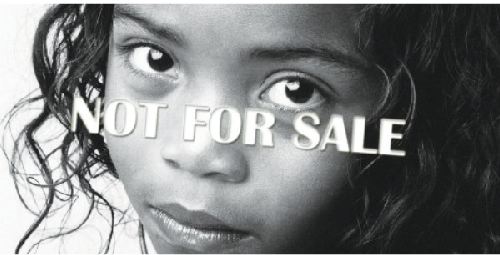As the World Day Against Trafficking in Persons was marked globally on July 30, 2015, notable world figures, in their messages to commemorate the day, decried the effect of the crime across the world, Senior Correspondent, ONYEWUCHI OJINNAKA, writes.
July 30 is United Nations World Day Against Trafficking in Persons. It is established by the UN to raise awareness on the plight of human trafficking victims and protect them.
UN Secretary-General, Ban Ki-moon, in his message to mark the day said: “Around the world, criminals are selling people for profit. Vulnerable women and girls form the majority of human trafficking victims, including those driven into degrading sexual exploitation.
“Trafficked persons are often tricked into servitude with the false promise of a well-paid job. Migrants crossing deadly seas and burning deserts to escape conflict, poverty and persecution are also at risk of being trafficked. Individuals can find themselves alone in a foreign land where they have been stripped of their passports, forced into debt and exploited for labour.
“Children and young people can find their lives stolen, their education blocked and their dreams dashed. It is an assault on their most basic human rights and fundamental freedoms.
“Criminal trafficking networks thrive in countries where the rule of law is weak and international cooperation is difficult. I call on all countries to fight money laundering and sign and ratify the UN conventions against corruption and transnational organised crime, including the latter’s human trafficking protocol,” he appealed.
Ki-moon, in his message, charged the international community to provide meaningful assistance to those in need, including protection and access to justice and remedies.
He applauded the donors who have enabled the UN Voluntary Trust Fund for Victims of Trafficking in Persons Fund to assist thousands of people, and at the same time urged greater contributions to help the millions of other victims of the crime move forward with their lives.
“Every country must join to overcome this transnational threat by supporting and protecting victims while pursuing and prosecuting the criminals. On this World Day Against Trafficking in Persons, let us resolve to act as one in the name of justice and dignity for all,” he solicited.
Also in his message to observe the day, Yury Fedotov, Executive Director United Nations Office on Drugs and Crime, said that millions of vulnerable women, men and children are being cruelly exploited, coerced into working in factories, fields and brothels or begging on the street, pushed into armed combat or forced marriages or trafficked so that their organs can be harvested and sold.
“We are living in an era of many crises and troubles, as Ki-moon has warned.
He noted that millions of people are fleeing from war and persecution, and the international community is grappling with acute migration challenges in the Mediterranean, the Balkans, in the Andaman Sea, Latin America and Africa, adding that for human traffickers, these hardships represent business opportunities for them.
According to Fedotov, the world is facing many grave challenges, and our resources are strained. But we cannot allow unscrupulous criminals to exploit these crises and take advantage of desperation and suffering.
Expressing worry that no place in the world is safe, he disclosed that the latest global report on Trafficking in Persons by the United Nations Office on Drugs and Crime found that the trafficking victims identified in 124 states were citizens of 152 different countries, noting that more victims of trafficking are children, especially girls under the age of 18.
Over the past decade, there has been no significant improvement in the overall criminal justice response to this crime. In the period covered by the global report, some 40 per cent of countries reported less than 10 convictions per year, some 15 per cent, while some did not record a single conviction.
This illustrates a level of impunity which is unacceptable and highlights the fact that, at the moment, the traffickers are getting away with their crimes.
To give hope to trafficking victims, and help end this terrible crime, Fedotov charges governments to take positive action by ratifying and effectively implementing the UN Convention against Transnational Organised Crime and its Protocol on trafficking: to protect trafficking victims, promote cooperation between countries and ensure that criminal traffickers, wherever they are, are brought to justice.
He added: “Governments should encourage everyone to educate themselves and help others become aware of the problem; consumers, employees, business owners and ordinary citizens can advocate measures to prevent the use of forced labour in operations and supply chains, and eliminate abusive and fraudulent recruitment practices that may lead to trafficking; and governments, companies and individuals should support the United Nations Voluntary Trust Fund for Victims of Trafficking in Persons.”
NAPTIP not relenting
In commemoration of the World Day against Trafficking in Persons in Nigeria, the National Agency for the Prohibition of Trafficking in Persons (NAPTIP) said it has secured additional 13 convictions from various federal high courts across the country, thus bringing the total convictions so far to 271.
Head, Press and Public Relations, Vincent Adekoye, said the convicted human traffickers, who are currently serving various jail terms, were arrested by operatives of NAPTIP in different locations within the country and were subsequently arraigned.
According to NAPTIP, while federal high courts sitting in Sokoto and Uyo convicted eight human traffickers and sentenced them, six others were convicted and sentenced by federal high courts in Benin, Ogun and Jos.
In the first legal battle, a Federal High Court sitting in Abeokuta, Ogun State capital, in suit No. FHC/AB/78C/13, convicted one Jennifer Ifeoma Umeh and two others who were charged under sections 12(a), 13(a), 15 and 19(a) of the Trafficking in Persons Act 2003 as amended, for deceitfully inducing three girls for sexual exploitation. While two of the accused were sentenced seven years, the third accused person was sentenced five years without any option of fine.
As the euphoria that greeted the conviction was about settling down, a Federal High Court in Jos, Plateau State capital, sentenced another human trafficker 10 years without any option of fine. The convict, Apisu Abdullahi, was charged under section 19(b) of Trafficking in Persons Act 2003 as amended for deceitful inducement for the purpose of forced labour.
Similarly, a Federal High Court sitting in Benin, Edo State capital, sentenced one Grace Friday Asuquo Okon two years for sexual exploitation.
In the same vein, a Federal High Court sitting in Sokoto State, convicted a three-member gang believed to be notorious in trafficking persons within the Northern part of the country. The convicts, Samuel Osarhiemen (M, 35) and Efe Bello (M, 41) were sentenced six years, while the female member of the gang, Oninomu Favour (23) was sentenced four years.
In another charge No/ FHC/S/35c/2015, two of the convicts were arraigned on a two-count charge of promotion of foreign travels that promote prostitution as well as deceitfully inducing the victims to move from one place to another, contrary to sections 16 and 19 of the Trafficking in Persons Prohibition Law 2003 as amended. The third convict was sentenced on a count charge of promotion of foreign travel which promotes prostitution. The sentences are to run concurrently.
NAPTIP further stated that in Sokoto, one Uche Odiechi Sunday, who was charged for deceitful inducement for forced labour and sexual exploitation, was found guilty and sentenced six years without an option of fine.
Indefatigable Lagos NAPTIP
Director, Lagos Zonal Command of NAPTIP, Joseph Famakin, has urged Nigerians to abhor human trafficking, stressing that NAPTIP would continue to enlighten the public on the dangers of human trafficking and its consequence until it was reduced to the barest minimum.
He said: “We are winning the war against human traffickers, but we also need to do more to curb the menace to its barest minimum. We will continue to do all we can to enlighten the public on the tactics and the routes human traffickers use to engage in their illegal acts.
“We will also continue to enlighten the stakeholders and security agencies on how to fight the war against human trafficking. Everyone should join forces to say no to human trafficking.”
He further advised Nigerians, especially parents, to monitor their children well enough, with the aim of putting an end to human trafficking.
“Parents should watch over their children and also bear the number of children they can cater for. We should train our children and not encourage other people to do that for us.
“Giving birth to the number of children we cannot cater for makes us seek help from people we do not know to cater for them on our behalf. These traffickers then take them to places we do not know which might make them vulnerable to trafficking, abuses and hawking in traffic.
“I enjoin everyone to join hands with us in NAPTIP to end human trafficking in our society,” Famakin pleaded.
A legal practitioner, Monday Ubani, said there should be more enlightenment programmes in the rural areas, adding that people there had yet to know the dangers of human trafficking.
“The level of enlightenment is not enough to reach out to the rural and urban areas. Some of them are not aware of the dangers and the legal consequences.
“We need to do more to educate the people because child abuse and baby factories are all over the country,” Ubani said.
He commended the efforts of the state and federal governments in ensuring the menace was curbed, urging NAPTIP to be more efficient in its responsibilities.
“We have the law, but they are ineffective. The agencies have not been effective enough; that is why the war has not been won.
“We really need the agencies to be on their toes, working with security agencies and educating the public more on the evil act,” he said.
A security expert, Onah Ekhomu, said unemployment, economic challenges, excessive poverty and lack of social security had led to people indulging in human trafficking.
“People, especially youths, feel they must succeed by all means, and a lot of young people think that if they go out of the country, they will become very rich.
“This is why young people avail themselves to be trafficked; because there is a lot of misconception.
“Nigeria has been the worst offender in this act throughout the whole world,” he said.
Lagos-based human rights lawyer, Festus Keyamo, said the government should endeavour to provide free education at all levels to reduce human trafficking.
“When parents find it difficult to train their children, it results in trafficking, which is why government should ensure free education across all levels.














